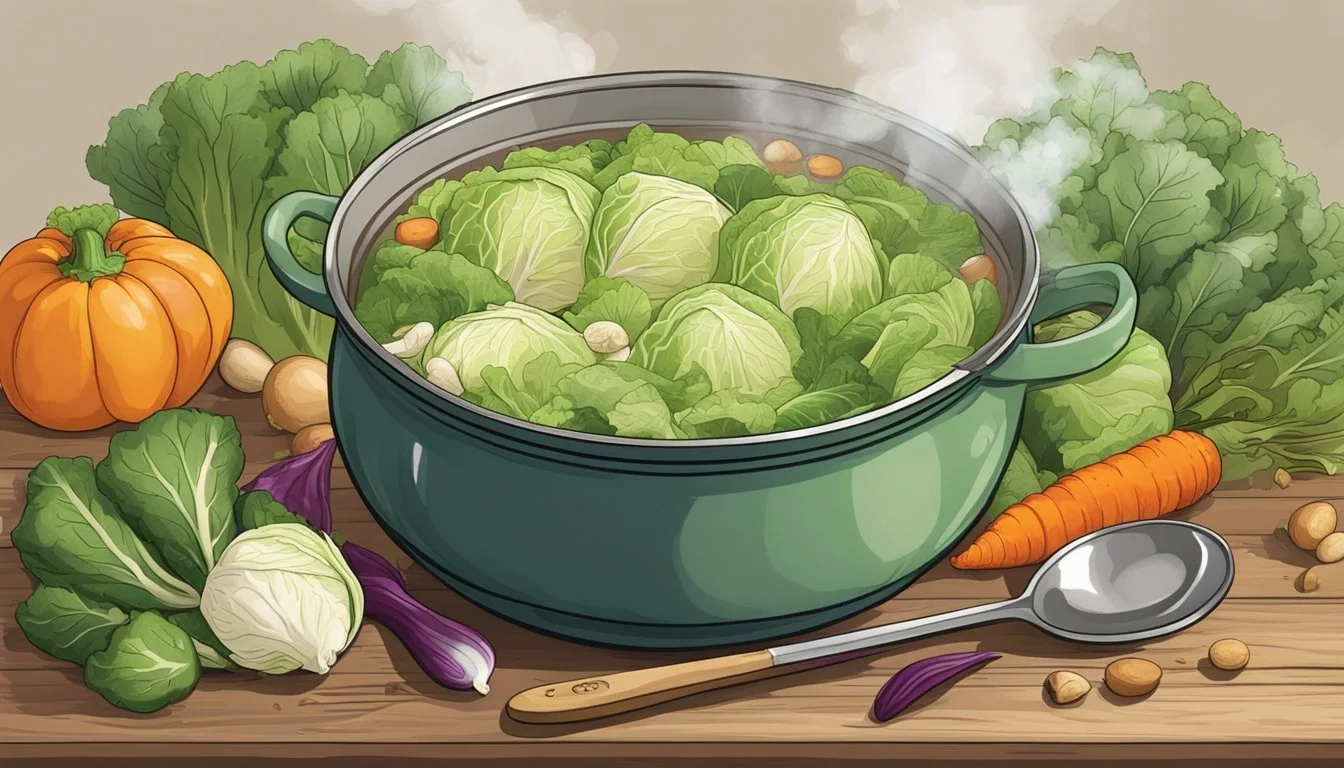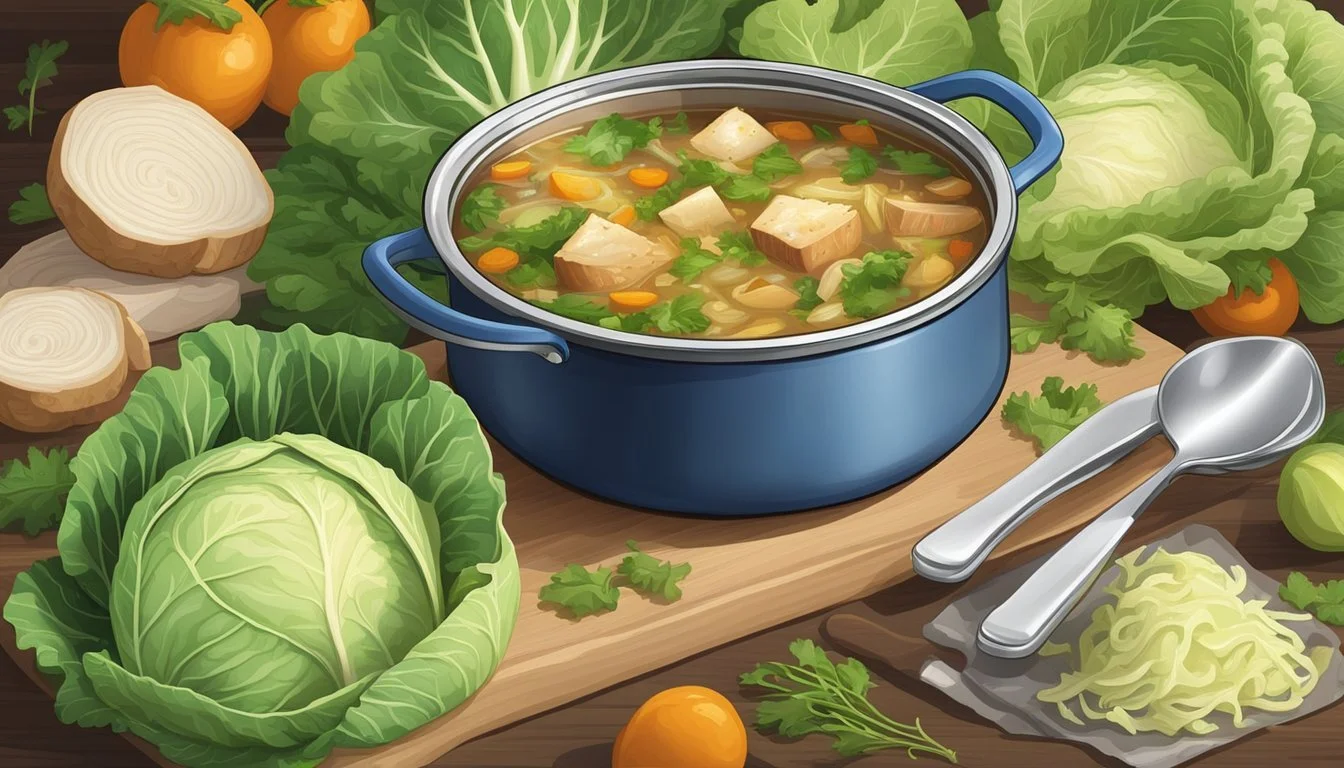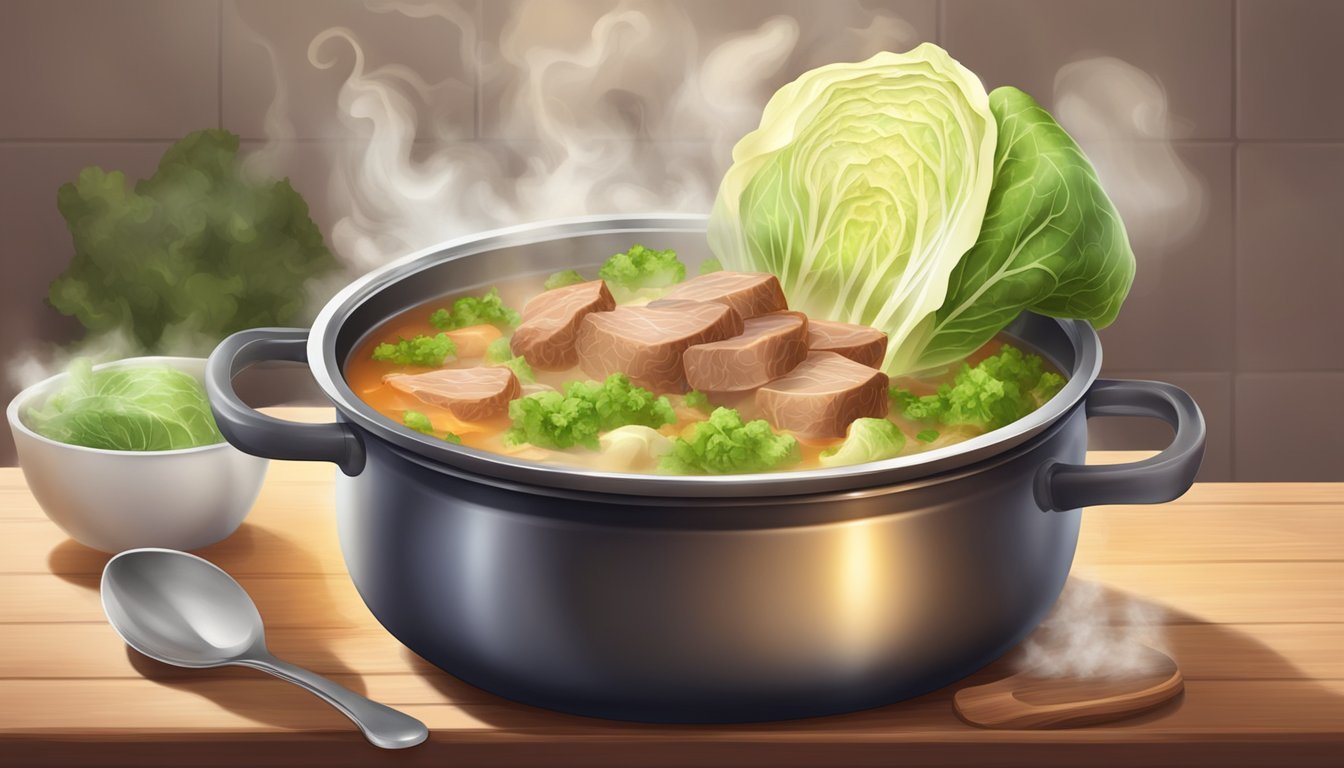Carnivore Diet vs. The Cabbage Soup Diet
Evaluating Short-Term Results and Long-Term Health Effects
The Carnivore Diet and the Cabbage Soup Diet are often discussed in the context of rapid weight loss strategies. The Carnivore Diet is a regimen that includes exclusively animal products, emphasizing meats, fish, and animal fats, while excluding other food groups such as fruits, vegetables, and grains. Proponents of this diet suggest that it can lead to weight loss and other health benefits, though it is typically not recommended for long-term adherence due to its restrictive nature and potential nutritional deficiencies.
In contrast, the Cabbage Soup Diet is a low-calorie diet that is predominantly plant-based. It centers around a homemade cabbage soup, supplemented with a specific combination of fruits and vegetables on different days. Its design is to facilitate quick weight loss over the course of a week. While this diet can indeed result in a notable drop in weight due to its low-calorie content, experts caution that it may not provide a sustainable or nutritionally balanced solution for long-term health and weight management.
Both diets are generally considered short-term fixes and are not typically endorsed by health professionals for long-term sustainability due to their restrictive profiles and potential risks. Understanding the effects of these diets on the body and their implications for long-term health is crucial for making informed decisions about weight loss and dietary practices.
Overview of the Carnivore Diet
The Carnivore Diet centers on the consumption of animal products and eliminates other food groups, emphasizing meat as a primary source of nutrition. It is a strict regimen that focuses on protein and fat while aiming at weight loss and other health benefits.
Fundamentals of the Carnivore Diet
The Carnivore Diet is founded on the principle that human beings should consume only animal products, predominantly meat. Proponents argue that it can lead to significant weight loss and may help with health conditions related to inflammation. It operates on the premise that early humans thrived on a meat-centric diet, suggesting that people today may also see health improvements by following this diet.
Common Foods and Restrictions in the Carnivore Diet
Common foods included in the Carnivore Diet are:
Meats: Beef, lamb, pork, chicken, turkey
Seafood: Fish, shrimp, other shellfish
Eggs
Dairy: (Some versions allow for limited amounts) Cheese, butter
Restrictions: Any food that does not come from animal sources, such as:
Fruits
Vegetables
Grains
Legumes
Nuts and seeds
Sugar
Carbohydrates
The diet is high in protein and fat, with virtually no carbohydrates.
Health Claims and Support from Proponents
Proponents of the Carnivore Diet claim it offers numerous health benefits. They suggest that it can assist in the reduction of inflammation, often cited in chronic diseases such as type 2 diabetes and heart conditions. Furthermore, advocates posit that a meat-rich diet could potentially reduce the risk of certain diseases like cancer due to the elimination of processed foods and sugars. However, it's important to note that there is limited scientific evidence to support these claims, and health experts often caution against the diet's high levels of saturated fat potentially leading to an increased risk of heart disease.
Overview of the Cabbage Soup Diet
The Cabbage Soup Diet is designed for rapid weight loss over a short period, primarily focusing on the consumption of cabbage soup alongside a selection of other low-calorie foods.
Fundamentals of the Cabbage Soup Diet
The Cabbage Soup Diet is a low-calorie diet that lasts for one week. During this period, individuals consume large amounts of cabbage soup, which acts as a filler to help dieters feel full without consuming many calories. This diet does not provide a long-term eating strategy but is aimed at quickly reducing body weight.
Common Foods and Restrictions in the Cabbage Soup Diet
Allowed foods:
Cabbage soup: Unlimited amounts
Fruits: Most are permitted, except bananas
Vegetables: Most are allowed, emphasis on leafy greens
Restrictions:
Starchy vegetables: Potatoes (except for a baked potato on one specified day)
Beans, peas, and corn: Excluded due to higher calorie content
Bananas: Generally not permitted until a specified day
Fluids recommended:
Water: Encouraged in unlimited quantities
Tea: Unsweetened variants are permitted
Consumers should prioritize fruits, other non-starchy vegetables, and drink lots of fluids, particularly water and unsweetened tea, to stay hydrated.
Health Claims and Rapid Weight Loss Potential
The Cabbage Soup Diet is often associated with claims of losing up to 10 pounds in a week. While these results seem promising for those seeking rapid weight loss, they largely reflect a reduction in water weight and not necessarily a sustainable fat loss. The diet’s fibrous content, coming from vegetables, may aid digestive health briefly, but its lack of variety and nutrients makes it unsuitable for the long term.
Nutritional Analysis
In evaluating the nutritional profiles of both the Carnivore and Cabbage Soup diets, one considers their macronutrient distributions, vitamin and mineral contents, and overall alignment with dietary recommendations for long-term health.
Carnivore Diet Nutrient Composition
The Carnivore Diet is characterized by its high protein and fat content, with virtually no carbohydrates. Adherents consume animal products exclusively, which can lead to a high intake of saturated fats and cholesterol. Proteins are abundant, sourced from meats, fish, and eggs, and are essential for muscle repair and growth. However, the diet lacks fiber, a necessary component for digestive health. Vitamins such as B12 and minerals like iron are plentiful in the Carnivore Diet, though it runs the risk of deficiencies in nutrients typically found in plant foods, such as Vitamin C and fiber.
Here is a list detailing the nutrient presence in the Carnivore Diet:
Nutrient: Protein
Presence in Carnivore Diet: High
Nutrient: Fats (overall)
Presence in Carnivore Diet: High
Nutrient: Saturated Fats
Presence in Carnivore Diet: High
Nutrient: Carbohydrates
Presence in Carnivore Diet: None
Nutrient: Fiber
Presence in Carnivore Diet: None
Nutrient: Vitamins (B12, D)
Presence in Carnivore Diet: High
Nutrient: Minerals (Iron, Zinc)
Presence in Carnivore Diet: High
Nutrient: Vitamins (C, E)
Presence in Carnivore Diet: Low/NoneCabbage Soup Diet Nutrient Composition
The Cabbage Soup Diet is low in fat and high in fiber, owing mostly to the high vegetable content of the soup which serves as the diet's centerpiece. The diet includes a variety of vegetables and thus provides a range of vitamins—like A and C—and minerals such as potassium. It is, however, typically low in protein since meats and other protein-rich foods are limited. The high fiber content supports digestive health, but the restrictive nature of the diet might result in inadequate intake of essential fats and certain nutrients found in a more balanced diet.
Here is a list detailing the nutrient presence in the Cabbage Soup Diet:
Protein
Presence in Cabbage Soup Diet: Low
Fats (overall)
Presence in Cabbage Soup Diet: Low
Saturated Fats
Presence in Cabbage Soup Diet: Low
Carbohydrates
Presence in Cabbage Soup Diet: Moderate
Fiber
Presence in Cabbage Soup Diet: High
Vitamins (A, C)
Presence in Cabbage Soup Diet: Moderate to High
Minerals (Potassium)
Presence in Cabbage Soup Diet: Moderate to High
Essential Fats (Omega-3, Omega-6)
Presence in Cabbage Soup Diet: Low
Health Impacts and Medical Perspectives
When considering diets such as the Carnivore and the Cabbage Soup Diet, the primary concerns center around their health impacts and what the medical community has to say about their long-term viability and safety.
Assessing Long-Term Health Risks and Benefits
The Carnivore Diet is often scrutinized for its potential in causing or exacerbating chronic diseases due to its high animal fat and protein content, which could affect cardiovascular health. Conversely, its supporters suggest it may have benefits such as weight loss or improved blood sugar control in the short term. The Cabbage Soup Diet is typically considered a quick fix for weight loss but raises concerns over its effect on muscle mass and metabolism. Neither diet provides a comprehensive solution to obesity or diabetes management in the long term.
Potential for Nutrient Deficiencies
Diets that severely restrict food groups, like the Carnivore Diet, are high in risk for nutrient deficiencies. Essential nutrients like fiber, certain vitamins, and antioxidants are not adequately provided when plant-based foods are eliminated. Similar risks are present with the Cabbage Soup Diet, which is also low in protein and essential fats. Registered dietitians emphasize the importance of a balanced diet to meet all nutritional needs.
Nutrients commonly deficient in a meat-only diet:
Vitamin C
Fiber
Calcium
Nutrients commonly deficient in the Cabbage Soup Diet:
Protein
Essential fatty acids
Medical Community's View on Fad Diets
The medical community often regards diets like the Carnivore and Cabbage Soup as "fad diets" due to their lack of adherence to nutritional guidelines and scientific evidence. Such diets may lead to rapid weight loss but are generally not sustainable and can have detrimental side effects. It is recommended that individuals adopting new eating patterns do so under medical supervision to mitigate health risks and ensure their diet addresses their complete range of nutritional needs.
Weight Management and Dieting
When considering weight management and dieting, it is critical to evaluate the effectiveness and sustainability of a diet plan. Both the short-term impact and the long-term implications for body weight and metabolism should be taken into account.
Short-Term vs. Long-Term Weight Loss Strategies
Short-term weight loss strategies, such as the Cabbage Soup Diet, offer a quick fix, typically involving severe calorie restriction. This diet includes a strict meal plan composed predominantly of cabbage soup, fruits, and vegetables, sometimes accompanied by a lean protein source. On the other hand, the long-term weight loss approach emphasizes gradual changes in eating and exercise habits, fostering sustainable results.
Sustainability of Diet Plans
A diet is considered sustainable if it can be maintained over time without causing harm or excessive stress to the individual. The Carnivore Diet focuses on high protein and fat intake, with meal plans consisting of meats, fish, and animal products. Although limiting in variety, some find it a sustainable approach due to satiety and simplicity. The Cabbage Soup Diet, however, is generally unsustainable for the long term, as it lacks essential nutrients, leading to potential health risks if followed for extended periods.
Impact of Dieting on Metabolism
Dieting can significantly affect one's metabolism—the rate at which the body expends energy or burns calories. While short-term diets may offer rapid weight loss, they can also cause a decrease in one's metabolic rate, especially when they involve drastic calorie reduction. This can be counterproductive as one may regain the body weight after returning to a regular diet. Sustainable diets that include a balance of nutrients and regular exercise are more likely to support a healthy metabolism over time.
Social and Psychological Considerations
When examining the Carnivore Diet and the Cabbage Soup Diet, one must consider the broader social and psychological impacts these diets have on individuals. These impacts can extend beyond physical health, influencing mental well-being and social interactions.
The Psychosocial Effects of Dieting
Fad diets often gain traction through social media platforms and podcasts, where rapid weight loss and dramatic health transformations are glorified. Dieters may experience temporary euphoria from quick results; however, these diets may also lead to social isolation due to their restrictive nature. The Carnivore Diet, with its emphasis on meat, may limit social dining options, while the Cabbage Soup Diet, with its singular focus, could lead to monotony and dissatisfaction.
Health benefits claimed by proponents of both diets include weight loss and improved metabolic markers. Conversely, potential risks linked to these diets include nutrient deficiencies and an unhealthy relationship with food. The psychological impact of cycling through phases of strict adherence and subsequent relapse can lead to feelings of failure and frustration.
Diet Trends and Influence of Media
Media portrayal of diets often fails to provide a balanced view, with celebrity endorsements and anecdotal success stories eclipsing the need for scientific scrutiny. The influence of media can alter an individual's perception of what constitutes healthy eating and can perpetuate the cycle of fad dieting.
Fad Diets and Media Impact:
Promotion: Aggressive marketing and celebrity endorsements.
Perception: Altered views on health and nutrition.
Pressure: Social expectations to conform to diet trends.
It's crucial to approach diet information with a critical eye and to consider the long-term sustainability of dietary practices, rather than seeking immediate and temporary fixes.
Comparative Analysis
This section delves into the contrasts and parallels between two dietary approaches: the Carnivore Diet and the Cabbage Soup Diet, assessing their respective advantages, limitations, and the variability of diet outcomes based on individual adaptation.
Comparing the Carnivore and Cabbage Soup Diets
Carnivore Diet:
Focus: Primarily animal products.
Nutrient Density: High in protein and fats.
Restrictive: Excludes plant-based foods.
Cabbage Soup Diet:
Focus: Low-calorie, high-fiber cabbage soup as staple.
Nutrient Density: Low in protein, can lack in essential fats.
Restrictive: Limited food variety, particularly in the initial days.
Benefits and Drawbacks: A Balanced View
Carnivore Diet:
Benefits: May initiate weight loss through a ketogenic effect. Can simplify meal planning due to limited food choices.
Drawbacks: May lead to nutrient deficiencies due to lack of plant-based foods. Risk of constipation and high blood pressure from high red meat consumption.
Cabbage Soup Diet:
Benefits: Encourages consumption of vegetables, introducing fiber and some nutrients into the diet at a low caloric cost.
Drawbacks: Not a balanced diet as it lacks sufficient protein and essential fats. May lead to short-term weight loss without long-term sustainability.
Diet Outcomes and Personalization
Customization of diets for individual health goals and conditions is crucial.
Carnivore Diet:
Potential outcome: Short-term remission of autoimmune symptoms in some individuals.
Personalization: Adjusting fat and protein ratios can address specific health concerns.
Cabbage Soup Diet:
Potential outcome: Brief reduction in weight primarily from water loss, not fat loss.
Personalization: Incorporating lean proteins and varied vegetables can enhance nutrient balance while maintaining low-calorie goals.
Each diet has distinct characteristics influencing balance and health outcomes. The ultimate decision should be informed by individual health needs, potential risks, and the inclusion of a nutrient-dense array of foods for long-term health.
Food Alternatives and Adaptations
When approaching both the Carnivore Diet and the Cabbage Soup Diet, individuals may seek ways to adapt these diets to include a broader range of nutrients while still aiming for weight loss.
Incorporating a Variety of Food Groups
On a Carnivore Diet, individuals consume exclusively animal products, focusing on meats, fish, eggs, and certain dairy products. To adapt the Carnivore Diet to include more variety, a dieter could consider:
Dairy: Introducing a range of dairy products that include essential nutrients, such as cheese and Greek yogurt, which provide calcium and probiotics.
Eggs: Incorporating eggs can offer vitamins D and B12, and a good source of protein.
While the Cabbage Soup Diet centers around a low-calorie soup made predominantly from cabbage and other vegetables, it tends to be very low in calories and may lack certain food groups. Adapting this diet to be more inclusive can involve:
Fruit Juice: Adding unsweetened fruit juice for a dose of vitamin C and antioxidants.
Leafy Greens: Including a variety of leafy greens like spinach and kale can offer fiber, iron, and vitamins A, C, and K.
Brown Rice: Integrating brown rice on specific days supplies fiber and vital minerals without excessive calorie intake.
Both diets inherently restrict or significantly limit other essential food groups. To ensure long-term health and sustainability, it is important for individuals to consider how they can balance their diet. Including a variety of nuts and seeds can provide healthy fats and proteins. Legumes, which are typically excluded in these diets, are excellent sources of fiber and plant-based protein. Introducing grains, such as whole wheat, oats, and barley, can diversify one's diet with additional fiber and nutrients, contributing to overall health and sustainable eating habits. It's crucial to maintain a balanced intake from all food groups, including fruits, vegetables, grains, proteins, and dairy, to promote nutritional completeness.
Lifestyle Integration and Maintenance
In considering the Carnivore and Cabbage Soup diets, one should focus on the potential for integration into a long-term healthy lifestyle and the feasibility of maintaining such eating patterns over time.
Implementing a Healthy and Balanced Eating Approach
Adopting either the Carnivore or the Cabbage Soup Diet requires careful consideration of nutritional balance and overall health objectives. The Carnivore Diet, heavy on animal protein and saturated fats, may not provide the fiber necessary for proper digestion and can make it challenging to achieve a balanced diet. Integration into daily life could demand supplementation or the addition of varied food groups to ensure nutritional completeness.
The Cabbage Soup Diet, while low in calories, emphasizes consuming large amounts of cabbage soup and specific groups of fruits and vegetables. It can lead to rapid weight loss, but lacks sustainability and may not support the body's long-term nutritional needs. A gradual shift towards a more balanced diet including lean proteins, whole grains, and a variety of produce is essential for maintaining health.
Healthy Lifestyle: Both diets should be paired with an active lifestyle and regular exercise to support cardiovascular health and muscle function.
Digestion: High-fiber foods alongside adequate hydration aid digestion, a segment overlooked in both diets.
Long-Term Health and Dietary Recommendations
Long-term health benefits are tied to eating patterns that can be sustained over a lifetime. Diets that eliminate entire food groups or heavily rely on specific foods might result in short-term weight loss but seldom lead to lasting healthy lifestyle changes. The body's state of ketosis induced by extreme low-carb diets like the Carnivore Diet could have unidentified long-term impacts.
Moderation and variety are key. Incorporating fruits, vegetables, whole grains, lean meats, and heart-healthy fats can help maintain body function and weight management. Regularly including foods rich in essential nutrients supports overall well-being and disease prevention.
Saturated Fats: Should be consumed in moderation, while unsaturated fats from sources like fish and nuts are encouraged.
Animal Protein: Should be balanced with plant proteins to promote a varied amino acid profile for muscle repair and growth.
In essence, both the Carnivore and Cabbage Soup diets may serve as temporary measures but integrating their principles into a healthy, balanced diet is critical for sustainability and long-term health.
Conclusion
The Carnivore Diet and the Cabbage Soup Diet are examples of restrictive plans aimed at quick results. The Carnivore Diet consists primarily of animal products and suggests a high intake of protein and fat, severely limiting carbohydrates. In contrast, The Cabbage Soup Diet focuses on low-calorie soup accompanied by a specific selection of fruits and vegetables.
Sustainability: Experts advise caution with such diets for long-term health. Neither plan provides a balanced diet and may lead to nutrient deficiencies if followed for extended periods.
Balanced Nutrition: Absent in both diets.
Vitamins and Fiber: Limited in the carnivore diet.
Protein: Limited in the cabbage soup diet.
Health Risks: Potential risks include increased cholesterol and saturated fat intake on the carnivore diet and inadequate protein on the cabbage soup diet.
Weight Loss: Both diets may result in rapid weight loss primarily due to caloric restriction. This weight loss is often temporary, and individuals may quickly regain the lost weight once returning to regular eating patterns.
Maintenance: Neither diet is considered suitable for long-term diet planning. Long-term sustainability is questionable due to the potential monotony and nutritional imbalances.
Recommendations: Individuals seeking lasting health benefits should consider a diet that includes a variety of nutrients. Consultation with a healthcare provider is recommended to tailor a plan that accommodates individual health needs and promotes sustainable weight management.







